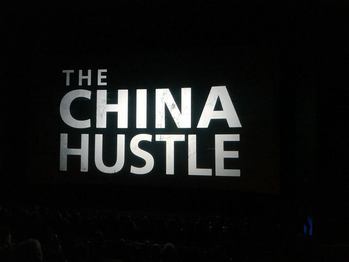 The China Hustle, a documentary about short sellers and their discovery of epic fraud in China. The China Hustle, a documentary about short sellers and their discovery of epic fraud in China. In 2010, a small group of mostly amateur investors began researching dozens of Chinese public companies traded on North American stock exchanges. Share prices were doubling and tripling over short periods of time, and the sleuths wondered if the boom was too good to be true. What they discovered was a massive string of frauds led by companies whose business was a fraction of what they were telling shareholders. It was a house of cards ready to blow over. These investors, including Dan David of FG Alpha Management and Carson Block of Muddy Waters Capital (both DLPR clients), shorted the stocks and published their research online for everyone to scrutinize. While the stocks usually plummeted in value, these so-called activist short sellers were often met with a biting blowback from the investment industry and many China bulls on Wall Street. Nevertheless, they continued to alert regulators, lawmakers and everyday investors, but little or no immediate action was taken even as massive regulatory overhauls such as Dodd-Frank targeted other corners of the financial industry. Despite some high-profile blowups, like Sino Forest, which Muddy Waters identified and Canadian authorities confirmed was a giant fraud, most of the wrongdoing went unreported outside of the major financial media. But in early 2015, Sarah Gibson, a documentary filmmaker, caught on to the story and approached us about filming some of our short seller clients. More than two years later, The China Hustle premiered at the recent Toronto International Film Festival to a packed house. In addition to Gibson, who is a producer, the film was written and directed by Jed Rothstein, executive produced by Alex Gibney and Frank Marshall, and backed by 2929 Entertainment (led by Mark Cuban and Todd Wagner). Variety called it “wildly entertaining” and dubbed the film a sequel to The Big Short. It “is assured a theatrical push and a long life on streaming,” they said. If it attracts wider attention, The China Hustle will hopefully help the public understand why markets need highly skeptical investors who put their money and reputations on the line. Devising communication strategies for activist short sellers is never easy - it’s a constant battle to educate the public on why they should be taken seriously. Short sellers are often criticized by the media and business leaders and have been sued for billions of dollars by public companies with vast resources and global reach. No matter how accurate their research is, activist short sellers are almost always cast as alarmists who yell fire in crowded theaters and profit from the ensuing stock selloff. But convincing the public that activist short selling adds value to our markets is tough - there’s something about betting against a company that rubs people the wrong way. Even after the premiere of the film showing the benefits these companies provide, an audience member called for a ban on short sellers in the market during a Q&A session with the filmmakers and others. “Short sellers are doing what the regulators aren’t doing and they are policing the market in a way the regulators aren’t,” said Gibney, an Oscar-winning documentary filmmaker (Enron: The Smartest Guys in the Room). Dan David, who is also a co-founder of GEOInvesting and one of the heros of the film, called the idea of a ban “epically ridiculous” and explained that two sides of every story deserve to be told. The company’s public filings tell one side and short sellers tell another. The market decides which side to believe. Short sellers search in corners of the financial world that regulators and other official watchdogs either don’t have the resources or expertise to uncover. Our recognition of the value these firms can provide explains why our firm represents selected short sellers, as well as conventional investment firms. As the film shows, nearly everyone in the markets, from law firms and accounting firms to investment banks turned a blind eye to multiple red flags as long as investors were hot on China. Even with the exposure of dozens of Chinese frauds by short sellers, the schemes have continued, albeit at a much slower pace, and almost no one has been held accountable. Pension funds and other investors have lost billions. Yes, the shorts and their investors can make money on these bets, and they don’t hide that fact. But there are major risks involved. A short’s research can be right, but the market may not agree with it. There have been plenty of times when short sellers were squeezed and shares rocketed upwards. It’s a dangerous and risky game (one researcher in the film was jailed for two years in China) and potential losses are unlimited because there’s no ceiling on how high a stock price can go. Bottom line: Activist short selling is a tough business, but the markets should be thankful that it exists. Next up, the film has its U.S. premiere at the Hamptons International Film Festival. |
Categories
All
|
|
Please see Terms of Use
|
 RSS Feed
RSS Feed